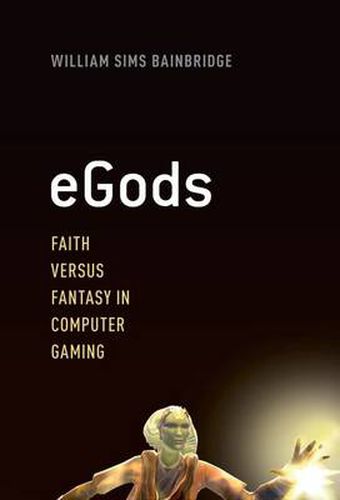Readings Newsletter
Become a Readings Member to make your shopping experience even easier.
Sign in or sign up for free!
You’re not far away from qualifying for FREE standard shipping within Australia
You’ve qualified for FREE standard shipping within Australia
The cart is loading…






William Bainbridge takes an in-depth look at the fantasy religions that exist in 34 different massively multiplayer online roleplaying games. He categorizes the religions, noting similarities across the games. He points, for instance, to the prevalence of polytheism: a system which, Bainbridge argues, can function as an effective map of reality in which each deity personifies a concept. Religions are as much about conceptualizing the self as conceptualizing the sacred. Most games allow the players to have multiple avatars, an idea Bainbridge likens to contemporary scientific ideas about personality. He also focuses on sacred spaces; the prevalence of magic and its relationship to the computer program and programmer; the fostering of a tribal morality by both religion and rules programmed into the game; the rise of cults and belief systems within the game worlds (and how this relates to social science theories of cult formation in the real world); and, of course, how the gameworld religions depict death. As avatars are immortal, death is merely a minor setback in most games. At the same time, much of the action in some gameworlds centers on the issue of mortality and the problematic nature of resurrection.
Bainbridge contends that gameworlds are giving us a new perspective on the human quest, one that combines the arts and simulates most aspects of real life. The quests in gameworlds also provide meaning for human action, in terms of narratives about achieving goals by overcoming obstacles. Perhaps meaning does not naturally exist in our universe, but must be created by us, both in our fantasies and in day-to-day life. Like the games analyzed in this book, he says, traditional religions are fantasies that should be respected as works of art in a future civilization of disbelief.
$9.00 standard shipping within Australia
FREE standard shipping within Australia for orders over $100.00
Express & International shipping calculated at checkout
William Bainbridge takes an in-depth look at the fantasy religions that exist in 34 different massively multiplayer online roleplaying games. He categorizes the religions, noting similarities across the games. He points, for instance, to the prevalence of polytheism: a system which, Bainbridge argues, can function as an effective map of reality in which each deity personifies a concept. Religions are as much about conceptualizing the self as conceptualizing the sacred. Most games allow the players to have multiple avatars, an idea Bainbridge likens to contemporary scientific ideas about personality. He also focuses on sacred spaces; the prevalence of magic and its relationship to the computer program and programmer; the fostering of a tribal morality by both religion and rules programmed into the game; the rise of cults and belief systems within the game worlds (and how this relates to social science theories of cult formation in the real world); and, of course, how the gameworld religions depict death. As avatars are immortal, death is merely a minor setback in most games. At the same time, much of the action in some gameworlds centers on the issue of mortality and the problematic nature of resurrection.
Bainbridge contends that gameworlds are giving us a new perspective on the human quest, one that combines the arts and simulates most aspects of real life. The quests in gameworlds also provide meaning for human action, in terms of narratives about achieving goals by overcoming obstacles. Perhaps meaning does not naturally exist in our universe, but must be created by us, both in our fantasies and in day-to-day life. Like the games analyzed in this book, he says, traditional religions are fantasies that should be respected as works of art in a future civilization of disbelief.